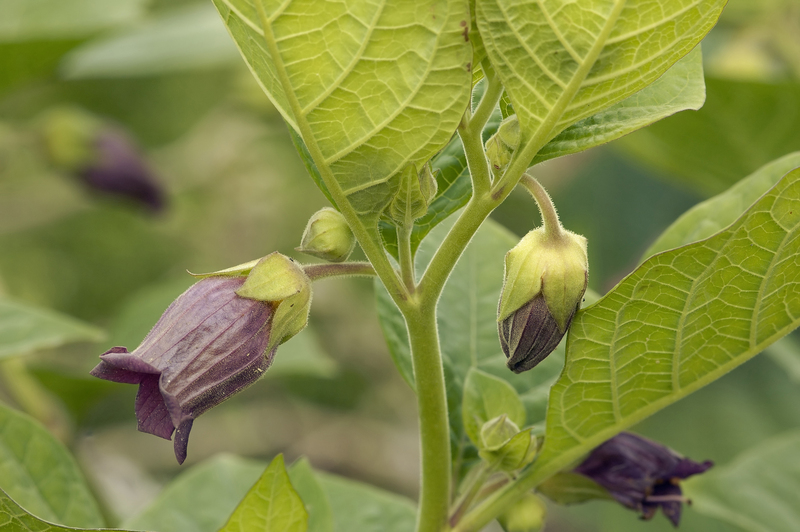Embrace Nature with Your Own Herb Garden
Posted on 02/07/2025
Embrace Nature with Your Own Herb Garden
Imagine stepping outside and plucking fresh basil leaves for your homemade pasta sauce. Envision the satisfaction of nurturing vibrant greenery that not only brings delightful flavors to your kitchen but also improves your wellbeing. Creating your own herb garden is one of the most rewarding and sustainable ways to embrace nature, right in your backyard or even on your windowsill.
In this comprehensive guide, we will explore why you should consider starting a personal herb garden, how to select the best herbs for your climate and cuisine, and provide step-by-step instructions for setting up and maintaining a flourishing natural haven packed with aromatic plants.
Why Embrace the Beauty of a Home Herb Garden?
Gardening has seen a resurgence, as more people look for ways to connect with nature and adopt healthier lifestyles. By cultivating your own herbal oasis, you tap into age-old traditions, enhance your meals, and turn your living space into a thriving, fragrant paradise. Here's why you should consider embracing nature with a herb garden of your own:
- Fresh Flavors Anytime: No more running to the grocery store for wilted herbs. Simply snip what you need, whenever you need it.
- Eco-Friendly Solution: Reduce single-use plastic waste and carbon footprint from packaged supermarket herbs.
- Cost-Effective: A small initial investment yields continual harvests, saving you money throughout the growing season.
- Therapeutic Benefits: Tending an herb garden is a calming, stress-relieving activity that nurtures both body and mind.
- Decorative Appeal: Herb gardens enhance patios, balconies, windowsills, and outdoor spaces with lush greenery and inviting aromas.
Seasonal Versatility of Herb Gardens
From spring's sprouting mint and chives to autumn's lingering rosemary and sage, a personal herb garden can provide year-round color and harvest. Embracing natural herb gardens allows you to fully appreciate the cycles of nature and savor the freshest ingredients across every season.

Selecting the Right Herbs for Your Home Garden
Before you start digging, it's essential to choose herbs that are aligned with your space, climate, and culinary interests. There are countless varieties of herbs, but here are some recommendations to get you started:
Top Easy-to-Grow Culinary Herbs
- Basil: The ultimate summer herb, perfect for Italian dishes and refreshing pesto.
- Mint: Hardy and fast-growing, ideal for teas, desserts, and cocktails.
- Rosemary: Beautiful, aromatic, and drought-tolerant, great for roasting meats and potatoes.
- Parsley: Adds freshness to salads, soups, and sauces and is full of vitamins.
- Chives: Mild onion flavor, excellent for garnishing eggs, potatoes, and dips.
- Thyme: Versatile for Mediterranean cuisine, pairs well with poultry and vegetables.
- Cilantro: Essential for Latin American and Asian dishes, known for its zesty flavor.
- Sage: Classic pairing for meats, pasta, and holiday stuffing recipes.
- Dill: Perfect for pickling, fish dishes, and creamy sauces.
Factors to Consider When Choosing Herbs
- Sunlight: Most culinary herbs thrive with at least 6 hours of sunlight daily.
- Climate: Some herbs are frost-sensitive (basil, cilantro), while others tolerate cold (oregano, chives, thyme).
- Available Space: Many herbs, like mint, can quickly overtake garden beds, so container planting may be ideal.
- Personal Taste: Select herbs you love to cook and experiment with.
Tip: If new to herb gardening, start with 3-5 types that match your favorite recipes and see what thrives in your unique conditions.
How to Start Your Own Herb Garden: Step-by-Step
Step 1: Planning Your Herb Garden
- Location Selection: Find a sunny spot. A south-facing window, patio, or dedicated raised bed works best.
- Containers vs. Garden Beds: Containers offer flexibility and control over soil and drainage. Garden beds provide more room for expansive growth.
- Herb Placement: Group herbs with similar watering and sunlight needs together for optimal growth.
Step 2: Preparing the Soil
- Soil Type: Most herbs prefer well-draining, loosely packed soil enriched with organic compost.
- pH Level: Aim for neutral to slightly alkaline soil (pH 6.0-7.5).
Step 3: Planting Your Herbs
- Seeds vs. Seedlings: Starting from seed is economical, but seedlings give a head-start and are often easier for beginners.
- Spacing: Allow proper airflow. Each herb has different needs--consult seed packets or labels for specific instructions.
- Watering: Keep soil moist, but not soggy. Herbs like lavender and rosemary prefer drier conditions, while mint and parsley like more moisture.
Step 4: Caring for Your Herb Garden
- Regular Watering: Water thoroughly when the top inch of soil feels dry.
- Fertilization: Use an organic, slow-release fertilizer every 4-6 weeks for lush growth.
- Pruning and Harvesting: Pinch back leaves regularly to encourage branching and prevent flowering.
- Pest Management: Herbs are generally pest-resistant, but inspect for aphids and snails. Use natural solutions like soapy water or companion planting.
Main Types of Herb Gardens
Container Herb Gardens
If you lack garden space, a container herb garden is a fantastic solution. Embracing nature with a potted herb garden means you can grow fresh herbs on balconies, windowsills, or even kitchen countertops. Choose pots with drainage holes and fill them with high-quality potting mix. Grouping herbs together in larger planters can create a stunning visual effect while maximizing space.
Indoor Herb Gardens
A windowsill herb garden lets you nurture nature all year round, regardless of outdoor conditions. Herbs like basil, chives, parsley, and mint adapt well indoors with sufficient sunlight or under grow lights. Indoor gardens are also convenient for snipping fresh herbs during meal preparation.
Raised Bed Herb Gardens
For larger spaces, a raised bed makes it easy to manage soil quality, drainage, and weed control. Raised beds are ideal for grouping multiple herbs and can double as ornamental features in your yard. Design your garden in attractive shapes--circles, spirals, or even vertical structures for a modern touch.
Tips for a Thriving Herb Garden All Year
- Rotate Your Crops: Move herbs around seasonally to avoid soil fatigue and reduce pests.
- Overwintering: Bring tender herbs indoors during winter or mulch hardy herbs for protection outdoors.
- Frequent Harvest: Regular picking encourages herbs to grow bushier and delay flowering.
- Mulching: Add a layer of mulch to outdoor garden beds to retain moisture and suppress weeds.
Remember, the key to a successful herb garden is observation and adjustment. Every environment is different, so don't hesitate to experiment with herb locations, watering routines, and plant combinations until you discover what works best in your unique space.
Nutritional and Health Benefits of Homegrown Herbs
Beyond flavor, cultivating a herbal garden offers a wealth of nutritional and therapeutic advantages:
- Antioxidants: Many herbs, including oregano, rosemary, and thyme, are rich in antioxidants that help combat inflammation and cellular damage.
- Vitamins and Minerals: Parsley, basil, and chives are packed with vitamin C, K, and essential minerals like iron and calcium.
- Digestive Aid: Mint and fennel can ease indigestion and support healthy gut function.
- Mental Wellbeing: The act of gardening itself, and the calming scents of lavender and chamomile, promote relaxation and reduce stress.
- Natural Air Purifiers: Indoor herb gardens help filter air and bring freshness inside your home.
Eco-Friendly and Sustainable Living
By establishing your own herb garden, you contribute to a greener planet. Growing your own herbs reduces dependency on industrial agriculture, decreases transportation emissions, and eliminates packaging waste. Organic gardening techniques also support local biodiversity by attracting pollinators like bees and butterflies, making your backyard or balcony a miniature ecosystem.

Creative Uses for Homegrown Herbs
- Infused Oils and Vinegars: Preserve flavors by infusing olive oil or vinegar with sprigs of rosemary, thyme, or basil.
- Herbal Teas: Fresh mint, chamomile, and lemon balm make soothing, caffeine-free infusions.
- Natural Remedies: Use calendula and lavender in homemade skincare for gentle healing properties.
- Culinary Inspiration: Elevate every meal, from salads to desserts, with handpicked, ultra-fresh flavor.
- Craft Projects: Dry herbs for fragrant sachets, potpourri, or even decorative wreaths.
Conclusion: Start Your Herb Garden and Embrace Nature Today
Embracing nature with a home herb garden connects you to the rhythms of the earth while bringing beauty, health, and fresh flavors right to your fingertips. Whether you have acres of land or a single sunny windowsill, the joy of herb gardening is accessible to everyone. With minimal effort, some patience, and a touch of creativity, you can cultivate a lush retreat that nourishes your body and soothes your soul.
So, roll up your sleeves, breathe in the earthy aromas, and start your journey into the rewarding world of herb gardening. Nature is waiting--right outside your door or even on your kitchen counter!
Frequently Asked Questions
- What herbs are easiest for beginners? Mint, basil, chives, and parsley are some of the easiest to grow and care for.
- Can I grow herbs indoors? Absolutely! Herbs like basil, mint, and parsley do well in pots on sunny windowsills.
- How often should I water my herbs? Most herbs need consistent moisture, but be careful not to overwater. Let the soil dry slightly between waterings.
- Do all herbs need full sun? Most herbs prefer full sun, but some, like mint and parsley, tolerate partial shade.
- How do I harvest herbs for the best growth? Use clean scissors to trim leaves regularly, which encourages new growth and prevents flowering.
Ready to embrace nature with your herb garden? Start small, enjoy the process, and reap the endless rewards of homegrown herbs!

